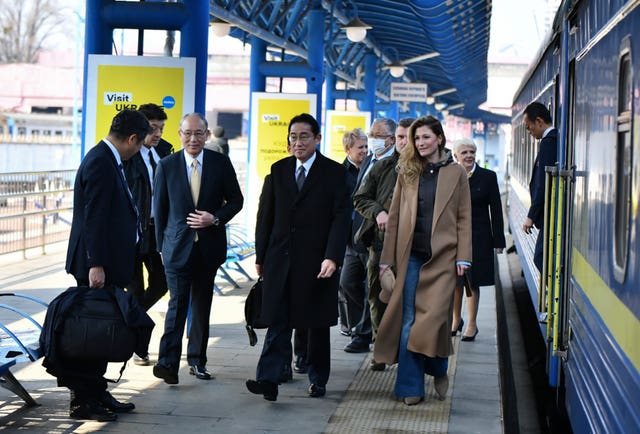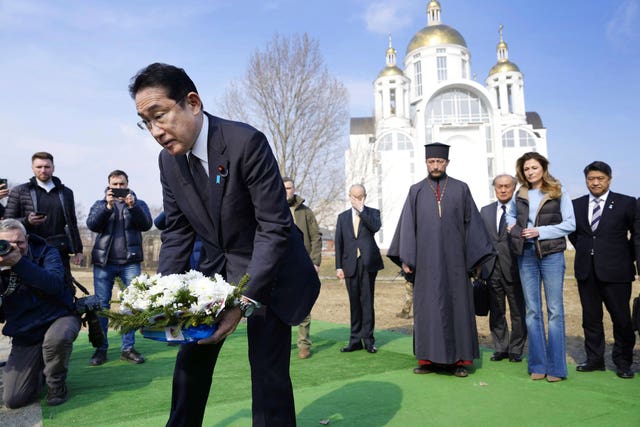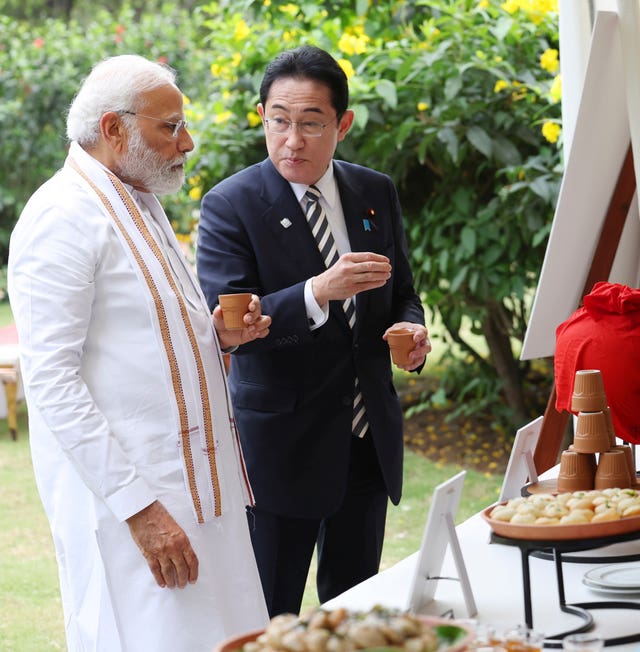Japanese Prime Minister Fumio Kishida has made a surprise visit to Kyiv, stealing some of the global attention from Asian rival President Xi Jinping of China, who is in Moscow to show support for Russia against the West over the Kremlin’s invasion of Ukraine.
The two visits, about 500 miles apart, highlighted the war’s repercussions for international diplomacy as countries line up behind behind Moscow or Kyiv.
They follow a week in which China and Japan both enjoyed diplomatic successes that have emboldened their foreign policy.

Mr Kishida, who is to chair the G7 summit in May, will meet President Volodymyr Zelensky in the Ukrainian capital, coinciding with Mr Xi’s talks with President Vladimir Putin.
The Japanese leader will “show respect to the courage and patience of the Ukrainian people who are standing up to defend their homeland under President Zelensky’s leadership, and show solidarity and unwavering support for Ukraine as head of Japan and chairman of the G7″, during his visit to Ukraine, the Japanese Foreign Ministry said.
Mr Kishida told Ukrainian officials he plans to “provide maximum support in order to restore peace in Ukraine”.
Kyodo News said he visited a church in Bucha, a town outside Kyiv that became a symbol of Russian atrocities against civilians, laid flowers at a church there and paid his respects to the victims.

“I’m outraged by the cruelty. I represent the Japanese citizens to express my condolences to those who lost their lives,” he was quoted as saying.
US ambassador to Japan Rahm Emanuel tweeted about the “two very different European-Pacific partnerships”.
“Kishida stands with freedom, and Xi stands with a war criminal,” Mr Emanuel said, referring to last week’s action by the International Criminal Court, which issued an arrest warrant for Mr Putin, saying it wanted to put him on trial for the abductions of thousands of children from Ukraine.
The Russian leader warmly welcomed Mr Xi on Monday for a three-day visit the two major powers described as an opportunity to deepen their “no-limits friendship”.
At a meeting on Tuesday with Russian Prime Minister Mikhail Mishustin, Mr Xi said he had invited Mr Putin to visit China later this year for a top-level meeting of China’s One Belt, One Road regional initiative, which seeks to extend Beijing’s influence through economic co-operation projects.
Moscow and Beijing have both weathered international condemnation of their human rights record. The Chinese government has been widely condemned for alleged atrocities against Uighur Muslims in its far western Xinjiang region.
The allegations include genocide, forced sterilisation and the mass detention of nearly a million Uighurs.
Japanese public television channel NTV showed Mr Kishida riding a train from Poland to Kyiv, hours after he met Indian Prime Minister Narendra Modi in New Delhi and a week after a breakthrough summit with South Korean President Yoon Suk Yoel.

In New Delhi, Mr Kishida called for developing and global south countries to defend the rules-based international order and help stop Russia’s war.
Japan, which has territorial disputes over islands with both China and Russia, is particularly concerned about the close relationship between Beijing and Moscow, which have conducted joint military exercises near Japanese coasts.
Beijing’s diplomatic foray follows its recent success in brokering a deal between Iran and its chief Middle Eastern rival, Saudi Arabia, to restore diplomatic ties after years of tensions. The move displayed China’s influence in a region where Washington has long been the major foreign player.
China looks to Russia as a source of oil and gas for its energy-hungry economy, and as a partner in standing up to what both see as US aggression, domination of global affairs and unfair criticism of their human rights records.
Kyiv’s western allies have expressed concern that China might help Russia’s war effort, although Beijing insists it is a neutral broker in peace efforts.
Due to its pacifist principles, Japan’s support for Ukraine has been limited to equipment such as helmets, bulletproof vests and drones, and humanitarian supplies including generators.
Japan has contributed over £5.7 billion to Ukraine, and accepted more than 2,000 displaced Ukrainians and helped them with housing assistance and support for jobs and education, a rare move in a country that is known for its strict immigration policy.





Comments: Our rules
We want our comments to be a lively and valuable part of our community - a place where readers can debate and engage with the most important local issues. The ability to comment on our stories is a privilege, not a right, however, and that privilege may be withdrawn if it is abused or misused.
Please report any comments that break our rules.
Read the rules here